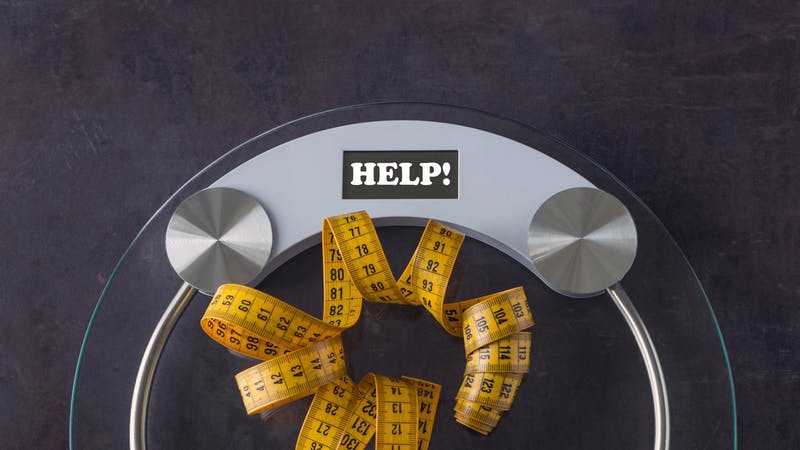We’re gonna be looking at the idea that fasted cardio is better for fat loss than doing fed cardio. In other words, doing cardio first thing in the morning on an empty stomach is better than doing cardio after having eaten a meal.
Where did this myth come from?

The basic theory has two prongs.
- First thing in the morning insulin levels are low and insulin is responsible for suppressing lipolysis. Doing cardio when insulin is low should result in a sort of release of this inhibition on lipolysis and allow more fat to be broken down during the cardio session.
- Since the first thing in the morning glycogen levels is low, our stored carbohydrate levels are low, the body should be more likely to turn to stored fat as a fuel source during the cardio session.
As it turns out both of these ideas have been supported by several lines of evidence. In 1976, In 1976, Albergue and Felig showed that when you consume carbohydrate during a cardio session your body starts using much more carbohydrate for fuel and much less fat for fuel. This early study was an interesting one they had all subjects performed light cardio for four hours but one group consumes 200 grams of glucose 90 minutes. After that consumption of glucose, the body drastically increased its use of glucose as fuel compared to the controls which actually utilize more and more fat as the session went on. This led a lot of people to believe that if you want to burn as much fat as possible during a cardio session, You should avoid eating carbs before and during the session and for the next 20 years or so this remained the prevailing dogma.
In 1997, one study showed that small elevations in plasma insulin before exercise suppresses lipolysis and appeared to limit fat oxidation. So this far it seems to really be the case that if you want to burn as much fat as possible during your cardio session you should perform it faster.
Where did it go wrong?

The main takedown against fasted cardio is that just because you burn more fat during the cardio session itself which is true. Doesn’t necessarily imply that you will lose more fat overall like over a 24-hour period. This was first brought to light in 2011. When Paoli and colleagues discovered that if you burn more of one substrate whether it carbs or fats during a cardio session. You’ll burn less of that substrate over the course of the next 24 hours. More precisely what their study actually measured was respiratory exchange ratio or RER which can be used as a measure of substrate utilization. Basically when you do out the math burning one molecule of carbohydrate results in a higher RER than burning one molecule of fat. So in this study what they found was that right before the cardio session the fed group had a higher RER implying they were burning less fat before in during the session. However, 12 hours after the session the RER numbers completely flipped. 12 and 24 hours post exercised the fasted cardio group was now burning significantly less fat. These new findings led the authors of the study to conclude that over long periods exercising after breakfast would be more effective than training fasted to lose weight through the increased metabolism and reduced RER in the hours after the training session.
However, while helpful for generating hypotheses. The studies we’ve looked at so far have been acute studies. Looking at short-term changes in substrate utilization, not long-term trials investigating full-scale changes in body fat. So for that, we need to turn to the first study of this kind, published in 2014 by Schoenfeld and colleagues. They took 20 young women and split them into a fasted cardio and a fed cardio group. They were following a diet that put them in a 500 calorie deficit with the same macronutrients between the groups and did one hour of moderate intensity cardio, three days per week either fasted or fed depending on their group. After four weeks both groups lost a significant amount of fat but they found no difference in fat loss between the groups. Implying that both fasted and fed cardio are equally effective which led the authors to claim that they refuted the veracity of the hypothesis that fasted exercise reduces body fat to a greater extent. The obvious limitations here are that the sample size is pretty small with only ten women in each group and the fact that the study was only run for 4 weeks. So a relatively short study duration so it could stand a reason that perhaps over more time one of the groups would have started to outperform the other in terms of fat loss.
These women although healthy weren’t all that leave with an average body fat percentage of 25 percent. So it could stand to reason that perhaps a leaner athletes or perhaps leaner men would see different results however again we wouldn’t necessarily speculate this given that in the field people have been very successful in terms of getting very lean with both fasted and fed cardio and like we said there doesn’t really seem to be any real strong mechanistic case for preferring one or the other.
IN THIS POST –
Scientific References:
https://www.ncbi.nlm.nih.gov/pubmed/2…
https://www.nsca.com/education/articl…
http://www.mdpi.com/2411-5142/2/4/43
https://www.ncbi.nlm.nih.gov/pubmed/2…
https://www.ncbi.nlm.nih.gov/pubmed/9…
https://www.ncbi.nlm.nih.gov/pubmed/9…
https://www.ncbi.nlm.nih.gov/pubmed/1…



